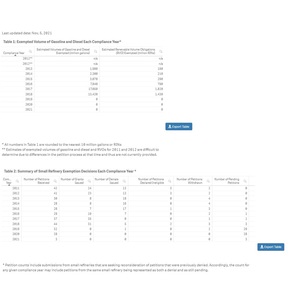EPA denies 1 SRE petition

November 5, 2021
BY Erin Krueger
The U.S. EPA published updated small refinery exemption (SRE) data on Nov. 5, reporting that the agency has denied one SRE petition for compliance year 2019. An additional SRE petition has also been filed for compliance year 2020.
According to the EPA’s SRE data dashboard, there are currently 65 SRE petitions pending, including one pending for compliance year 2016, one pending for compliance year 2017, three pending for compliance year 2018, 29 pending for compliance year 2019, 28 pending for compliance year 2020, and three pending for compliance year 2021.
Advertisement
Growth Energy called the EPA’s denial of the compliance year 2019 SRE petition promising. “As our industry awaits three years' of renewable volume obligations from EPA, we hope today’s SRE denial is an indication that they are working toward getting the RFS back on track,” said Emily Skor, CEO of Growth Energy. “For too long, refiners have misused SREs as a way avoid their statutory requirements to blend more clean, renewable fuels, and we’re encouraged that today’s SRE denial means that this SRE abuse will be a practice of the past. If our country wants to achieve the climate goals being discussed this week at COP26, we need to blend more cleaner-burning biofuels, not less, and EPA should take this into consideration when issuing the upcoming RVOs.”
The Renewable Fuels Association said it is greatly encouraged by the EPA’s action. “We are greatly encouraged by EPA’s decision to deny this bailout request from an oil refinery that has continually attempted to dodge its legal obligations to blend low-carbon renewable fuels,” said Geoff Cooper, president and CEO of the RFA. “It appears EPA and DOE are indeed following the criteria for deciding SRE petitions established by the Tenth Circuit Court decision in the RFA et al. v. EPA case. Our industry lost more than 4 billion gallons of demand due to the previous administration’s rampant abuse of the SRE program, and we are pleased to see that the days of EPA-induced demand destruction appear to be behind us. EPA’s new leadership appears to be making good on its promises to rein in the SRE program, and today’s decision is consistent with the new policy direction announced by EPA earlier this year and President Biden’s position that the last administration’s SRE abuse was a ‘gigantic mistake.’ However, 65 exemption petitions are still pending and we urge the Agency to swiftly deny any and all remaining applications that fail to pass the common-sense test established by the Tenth Circuit.”
Advertisement
Related Stories
CountryMark on July 22 celebrated the completion of more than $100 million in upgrades at its refinery in Indiana, including those related to soybean oil storage. The facility produces renewable diesel via coprocessing technology.
ATOBA Energy and Air Moana are partnering to implement scalable solutions for the supply of SAF. The collaboration aims to ensure long-term SAF availability while supporting local initiatives to develop sustainable fuel production in Tahiti.
While final IRS guidance is still pending, the foundation of the 45Z program is well defined. Clean fuel producers should no longer be waiting; they can now move forward with critical planning and preparation, according to EcoEngineers.
Neste Corp. on July 24 released second quarter results, reporting record quarterly renewable product sales volumes despite weaker margins. SAF sales were up nearly 80% when compared to the first quarter of 2025.
Valero Energy Corp. on July 24 released second quarter results, reporting a profitable three-month period for its ethanol segment. The renewable diesel segment posted a loss, but the company’s new sustainable aviation fuel (SAF) unit operated well.
Upcoming Events










